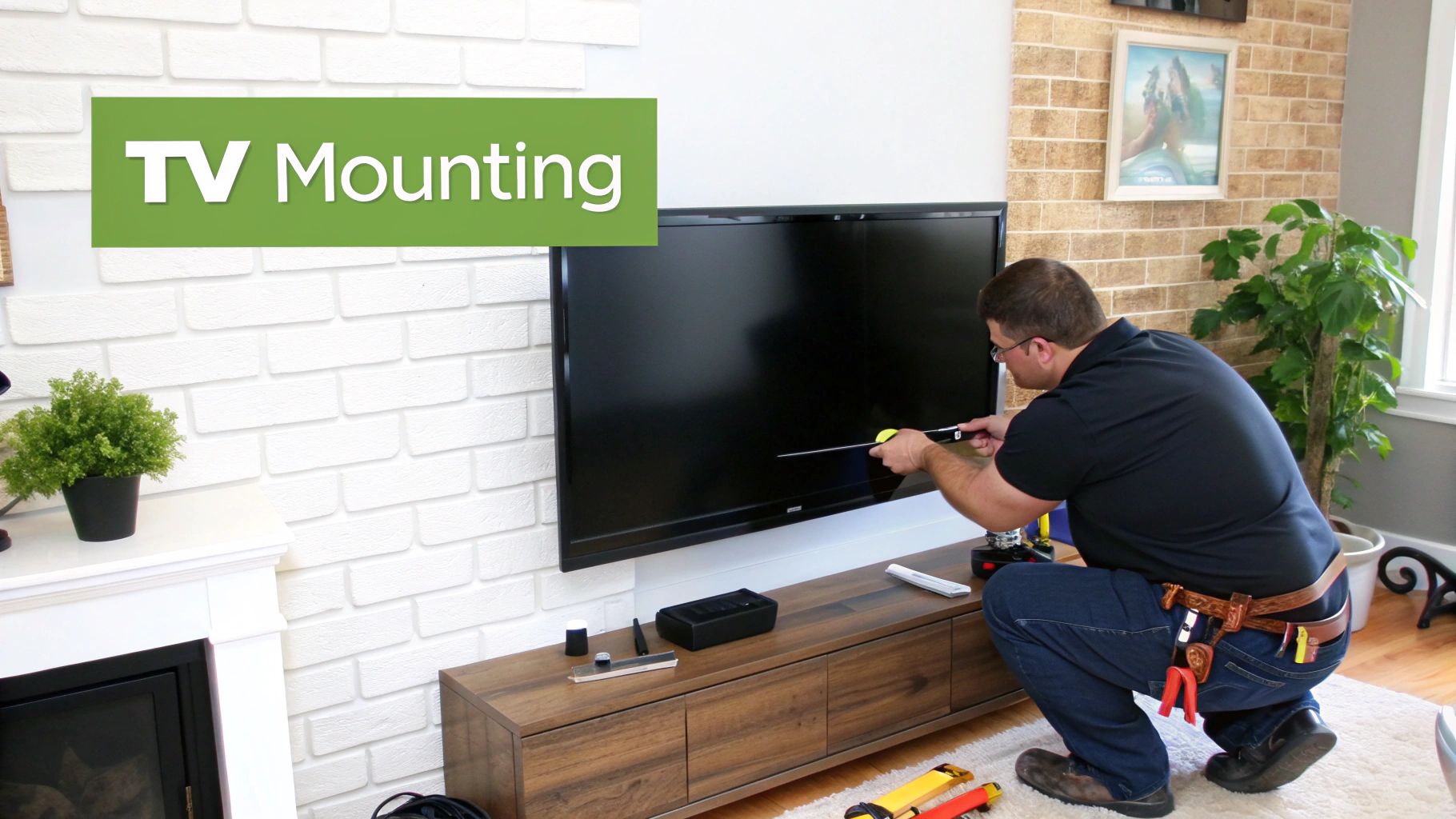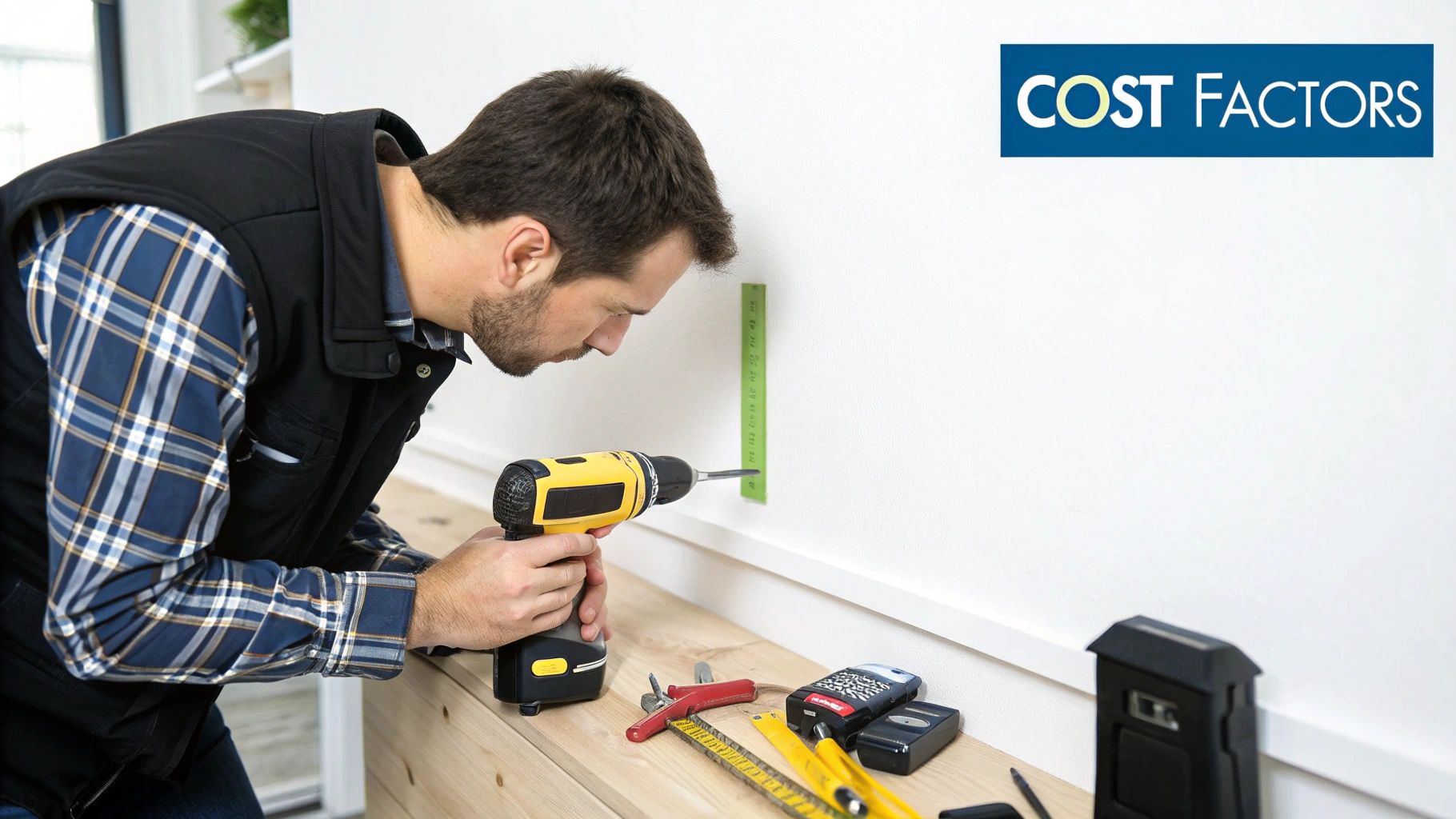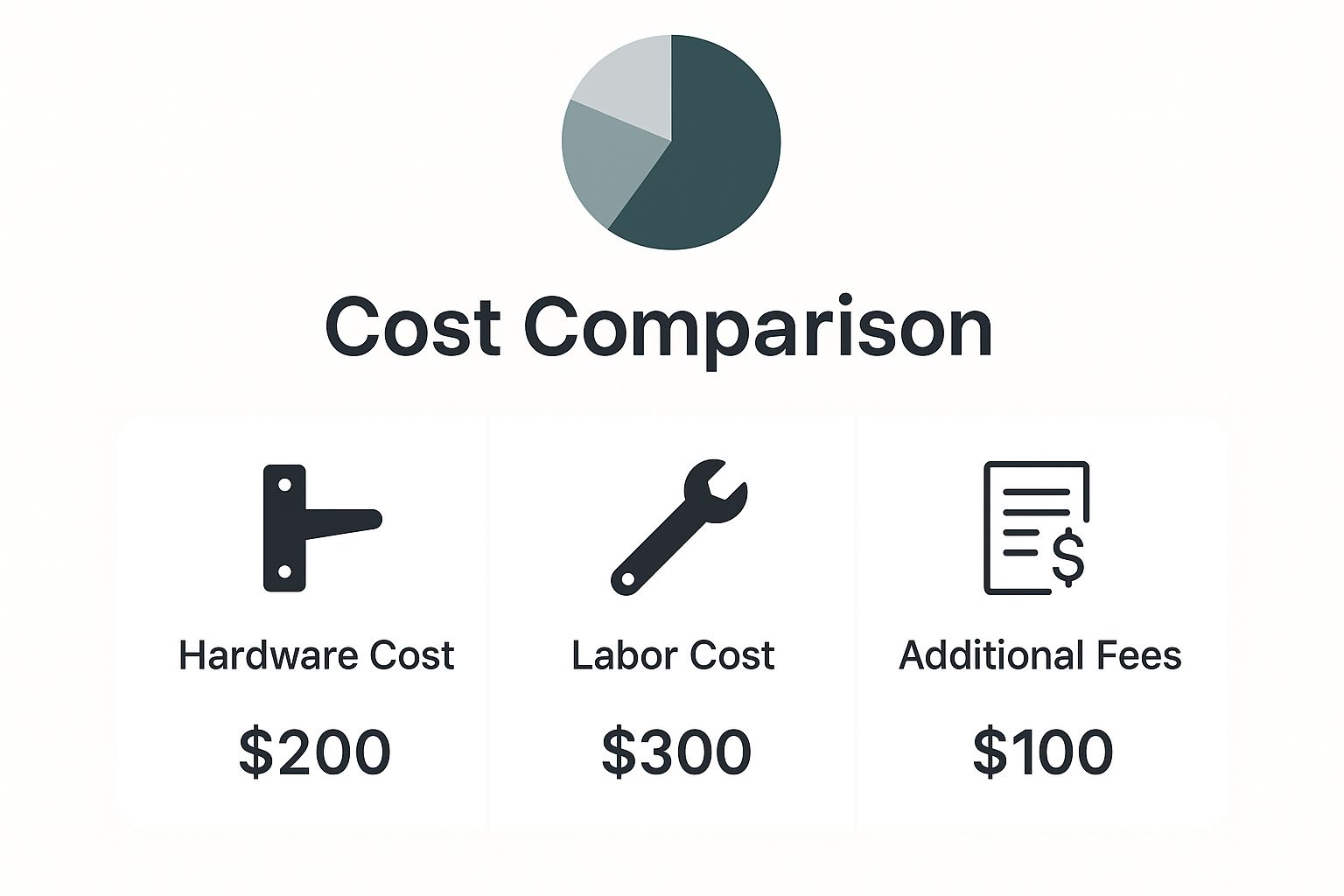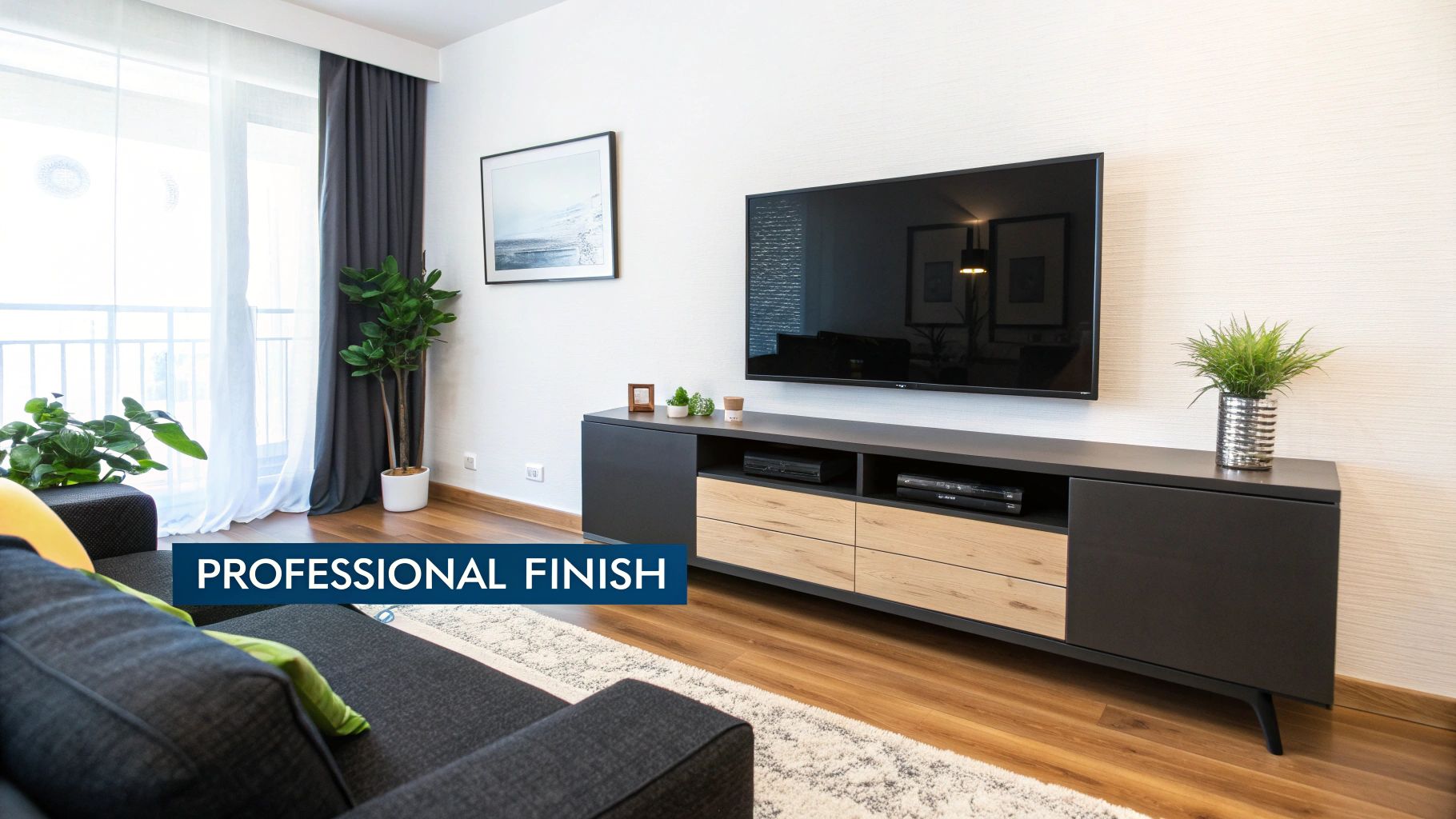So, you're ready to get that new TV up on the wall, but the big question is: what’s it going to cost?
The short answer is that a professional TV mounting service will probably set you back somewhere between $150 and $360. But the final number on the invoice can swing quite a bit depending on a few key details of the job.
What to Expect for TV Mounting Service Costs
Deciding to mount your TV is the easy part. Budgeting for it? That can feel a little more complicated. Think of the total cost like building with LEGOs—the basic installation is your foundation. Every extra piece you add, like hiding the wires or using a fancy articulating mount, changes the final look and, of course, the price.

Your initial quote is built around a few core things. First up is the size and weight of your television. Bigger, heavier screens often need two people to handle them safely, which bumps up the labor fee—usually the biggest chunk of the total cost.
Core Cost Components
To give you a clearer picture, let's break down the expenses you'll most likely see. Looking at industry data gives us a solid baseline for what most people end up paying.
According to HomeAdvisor, the national average to have a pro mount a TV is around $254. Most folks find their final bill lands somewhere between $156 and $358. As you'd expect, smaller TVs are cheaper to hang than those big, heavy ones. You can see more on national averages in their detailed home services guide.
This price range typically covers the basics: the labor for a standard installation on a simple drywall surface. For a quick look at how the costs usually break down, check out this table.
Quick Overview of TV Mounting Service Costs
This table provides a quick summary of the average costs associated with different aspects of a professional TV mounting service.
| Service Component | Average Cost Range |
|---|---|
| Basic Labor Fee | $100 – $250 |
| TV Mount Hardware | $25 – $150 |
| Standard Installation | $150 – $400 |
Having these fundamental costs in mind makes it much easier to look at a quote and know if you're getting a fair deal. If you're curious about the hardware side of things, you can explore our full collection of TV mounting solutions.
Next, we'll get into the specific things that can make those prices go up or down.
The Key Factors That Shape Your Final Bill
Ever wonder why one quote for mounting a TV comes in at a lean $150 while another pushes past $400? It’s not just random numbers. The final cost is a blend of your specific needs, your home’s construction, and even your zip code.
Think of it like this: hanging a small, lightweight TV is like putting up a picture frame. But securing a massive 85-inch screen? That's more like installing a heavy piece of cabinetry—it takes more hands, beefier hardware, and a whole lot more precision to get it right.

Once you understand what goes into the price, you can anticipate the costs and make smarter decisions. Let's break down the four biggest factors that will influence your final bill.
Your Television’s Size and Weight
The first, and most obvious, variable is the TV itself. A small 32-inch screen might weigh less than 20 pounds, making it a pretty straightforward one-person job. A modern 75-inch TV, on the other hand, can easily top 70 pounds.
That extra weight and bulk aren't just about heavy lifting. It pretty much demands a two-person team to make sure the screen isn't dropped or damaged during installation. Because of this, jobs involving TVs larger than 65 inches often include an extra charge of $25 to $50 to cover the second technician.
The Type of TV Mount Hardware
Not all mounts are created equal, and your choice has a direct impact on the price. The hardware itself has a cost, of course, but the real difference comes down to the labor needed to install it correctly.
- Fixed Mounts: These are the simplest and most budget-friendly. They hold the TV flat against the wall with no movement.
- Tilting Mounts: A step up, these let you tilt the screen vertically. This is great for reducing glare or if you're mounting the TV a bit higher than eye level.
- Full-Motion Mounts: This is the most complex and expensive option. These articulating arms allow you to extend, swivel, and tilt the TV, giving you the perfect view from anywhere in the room.
The logic is simple: a full-motion mount has way more moving parts and connection points than a basic fixed bracket. That means the installation is more involved and takes more time, which translates directly to a higher labor cost.
The Wall Material You Are Mounting On
The surface where you plan to hang your TV plays a huge role in the job's difficulty. Mounting into standard drywall with wooden studs is what most quotes are based on—it's quick and only requires standard tools.
But things get more complicated when installers run into tougher materials. Mounting a TV on brick, concrete, or stone calls for specialized drill bits, different anchors, and a lot more time and expertise to ensure a secure fit. This specialized work naturally bumps up the price, often by $35 or more.
Your Geographic Location
Finally, where you live matters. The biggest chunk of any TV mounting bill is labor, and those rates can vary a lot across the country. A pro working in a major city like New York or San Francisco has higher overhead and living expenses than an installer in a smaller town.
That difference is baked right into their pricing. Looking at recent data, labor typically ranges from $75 to $200, with the cost naturally trending higher in big urban areas. You can see more detailed 2025 cost breakdowns on Fixtman's blog. And for the best hardware for any job, check out our full collection of TV mounts.
Choosing the Right TV Mount for Your Budget
The actual hardware you choose is one of the biggest factors driving your final TV mounting service cost. Think of the mount as the foundation of your entire setup—the more complex it is, the more you can expect to pay for both the part itself and the labor to get it on the wall securely.
If you make a smart choice here, you'll avoid overspending on features you don't really need. The market basically breaks down into three types of mounts, each built for a different viewing style and price point. Your decision here really does ripple through everything, from the final look to the final invoice.
This infographic gives you a quick visual breakdown of how the hardware costs stack up against labor and other potential fees.

As you can tell, while the mount is a key piece of the puzzle, the labor often ends up being the single biggest line item on the bill, especially for the trickier installs.
H3: Fixed TV Mounts
A fixed mount is your most straightforward and wallet-friendly choice. It does exactly what the name implies: it holds your TV flat against the wall, almost like hanging a picture frame. There’s no movement or adjustment possible once it's up.
This style is perfect for rooms where you have a clear, dedicated viewing spot and can hang the TV right at eye level. If you're putting together a home theater or have a living room where everyone sits in the same general area, a fixed mount gives you that clean, low-profile look for the lowest cost.
H3: Tilting TV Mounts
Taking one step up in both price and function brings you to the tilting mount. This bracket lets you angle the screen vertically, usually giving you up to 15 degrees of downward tilt to play with.
That little bit of movement is a game-changer for cutting down on glare from windows or overhead lights. It's also the go-to solution when you have to mount the TV a bit higher than eye level, like over a fireplace. The ability to tilt down ensures you're still getting a great picture without having to crane your neck.
H3: Full-Motion TV Mounts
For the absolute best in flexibility, the full-motion mount is the top-tier option. These mounts feature an articulating arm that allows you to pull the TV out from the wall, swivel it left and right, and tilt it up and down.
It’s the ideal solution for large, open-concept rooms, spaces with multiple seating areas, or tricky corner installations. While they are the most expensive in terms of both the hardware and the installation time, they give you total freedom to point the screen wherever you need it. If you want to dive deeper into the specifics, our in-depth guide can show you how to choose the right TV wall mount.
To make things even clearer, let's break down the key differences in a simple table.
H3: TV Mount Type Cost and Feature Comparison
This table gives you a side-by-side look at fixed, tilting, and full-motion TV mounts, comparing what you can expect to pay for the hardware, the installation, and what situations each one is best suited for.
| Mount Type | Hardware Cost Range | Typical Installation Cost | Best For |
|---|---|---|---|
| Fixed | $20 - $60 | $75 - $150 | Straight-on viewing at eye level; budget-conscious setups. |
| Tilting | $30 - $80 | $100 - $175 | Reducing glare; mounting above eye level (e.g., over a fireplace). |
| Full-Motion | $40 - $150+ | $120 - $250+ | Corner mounting; large rooms with varied seating arrangements. |
Ultimately, matching the mount's features to your room's layout and how you actually watch TV is the surest way to get the best value for your money.
Uncovering Hidden Costs and Add-On Services
That initial quote for mounting your TV rarely tells the whole story. What you're usually seeing is the price for a straightforward, no-frills installation on a standard drywall surface. But let's be honest, the polished, professional setup you're picturing in your head often involves a few extra touches that can add to the final bill.
Think of it like buying a car. The sticker price gets you the base model, but if you want that premium sound system or the sunroof, the total goes up. TV mounting works the same way. Common add-ons are what create that seamless, high-end look most of us are after.

Knowing about these potential upcharges ahead of time is the best way to build a realistic budget. When you know what to ask about, you can get a comprehensive quote that won't leave you with any sticker shock when the job is done.
Common Add-On Services
Most installers have a menu of extra services to help you build out your dream home entertainment setup. Here are some of the most popular requests that will likely influence your total TV mounting service cost.
- In-Wall Wire Concealment: This is the big one. Hiding all the cables inside the wall gives you that clean, "floating TV" look everyone loves. It takes more work and a few extra materials, so expect it to add $75 to $150 to the final bill.
- Soundbar Mounting: A soundbar is a game-changer for audio, and mounting it right below the TV just looks right. Tacking on this service usually costs an additional $40 to $80.
- Device Setup: Need your Apple TV, Roku, or gaming console hooked up and configured? Installers can handle that for a small fee, often around $20 per device.
These services are what transform a basic installation into a fully integrated entertainment hub. They take a bit more time and expertise, which is naturally reflected in the price.
It's all about achieving a finished look. While a standard mount gets the TV on the wall, add-ons like wire concealment and soundbar installation are what make the entire setup feel deliberate and professional.
Potential Upcharges for Difficult Installations
Beyond the optional bells and whistles, some features of your home can just make the job more complex, leading to necessary upcharges. These aren't just for looks; they're required to get the TV mounted safely and securely.
One of the most common hurdles is mounting a TV over a fireplace. This almost always means dealing with brick or stone and requires very careful planning to protect the television from heat. For some specific guidance on this, our guide on how high you should mount your TV has some great insights.
The wall material itself is another huge factor. Drywall is the standard, but mounting on tougher surfaces like brick, concrete, or stone demands specialized tools and heavy-duty anchors. This extra degree of difficulty can easily add $35 or more to the labor cost.
Likewise, if your perfect spot for the TV doesn't have an outlet nearby, you'll need an electrician to install one. That's a completely separate and often significant expense. It's always a good idea to bring these things up with your installer right from the start to get the most accurate quote possible.
Professional Installation vs. DIY: What to Choose?
So, you've got the TV and the mount. Now for the moment of truth: Do you hire a pro to get this thing on the wall, or roll up your sleeves and tackle it yourself?
This really comes down to a classic trade-off between cost and confidence. The best choice for you depends on your skill level, the tools you have on hand, and how complex your specific installation is going to be.
On one hand, the biggest draw for a DIY approach is saving money on labor. By doing it yourself, you completely sidestep the installation fee, which can be a hefty chunk of the total cost. Plus, let's be honest—there's a real sense of satisfaction that comes from finishing a home improvement project on your own.
But going the DIY route isn't without its risks. One small mistake can lead to some seriously expensive problems, from a big hole in your drywall to the nightmare scenario of your brand-new TV crashing to the floor. Without the right tools and a bit of know-how, finding studs, drilling correctly, and getting the mount perfectly secure can turn into a stressful ordeal.
Why Hire a Professional Installer?
Hiring a professional installer is basically buying peace of mind. These folks have seen it all and have the experience to handle any curveballs your walls might throw at them, like surprise metal studs, tricky brick, or crumbly plaster.
They show up with specialized tools and know exactly how to get your mount perfectly level and securely anchored. This guarantees the safety of your expensive new TV.
On top of that, a professional service almost always includes a warranty. If anything goes wrong with the installation down the line, they're on the hook to fix it. For a lot of homeowners, that assurance alone is worth every penny.
The total cost for a professional TV mount installation, including both the mount and labor, can range widely. This variation reflects different mount types, TV sizes, and job complexity. Discover more insights on HomeGuide's pricing data analysis to see a full breakdown.
Weighing the Pros and Cons
Ultimately, the decision is yours.
If you're a confident DIYer with a good set of tools and a straightforward installation on standard drywall, you can definitely save some cash. But for massive TVs, complex full-motion mounts, or tricky wall surfaces, the expertise and security of a professional are tough to beat. A pro ensures the job is done right the first time, protecting your investment and your home.
Still not sure if a wall mount is the right move at all? Our guide comparing TV wall mounts versus stands can help you weigh your options. For a seamless, worry-free experience, explore our main collection of TV mounting hardware.
How to Save Money on TV Mounting Services
Now that you understand what goes into the cost of a TV mounting service, it's time to put that knowledge to work. You don't have to sacrifice a safe, quality installation to get a great deal—a few smart moves can seriously bring down your final bill.
With just a little planning, you can easily trim the fat from your quote and make sure you’re only paying for what you actually need.
Practical Tips for a Lower Bill
You have more control over the final price than you might think. A great way to start is by sourcing the hardware yourself. Instead of buying the mount directly from your installer, you can often find the same model (or a comparable one) for much less online or during a retail sale.
Another great strategy? Bundle your services. If you have other small handyman tasks on your to-do list, ask if they offer a package deal. Tackling another small job at the same time can sometimes lead to a better overall hourly rate than booking each task separately.
Getting multiple quotes is non-negotiable. Always contact at least three different installers to compare their pricing for the exact same job. This doesn't just help you find the best rate; it gives you a realistic idea of the fair market value in your area.
Prepare Your Space to Reduce Labor Time
One of the simplest ways to cut costs is to minimize the installer's time on-site. Before they even ring the doorbell, make sure the workspace is completely clear. Move the couch, take down pictures, and make sure there's an open path from the door to the wall where the TV is going.
This simple prep work means the technician can get straight to business instead of spending billable time moving your furniture. If you're comfortable with a bit of DIY, you could even get a head start on some of the work. Our complete guide on how to mount a TV to the wall breaks down the entire process, giving you a better handle on what's involved. By taking these proactive steps, you can directly influence the labor portion of your tv mounting service cost.
Frequently Asked Questions About TV Mounting Costs
Even after you've weighed the costs, a few questions might still be lingering. Let's clear up some of the most common ones people have right before they decide.
Is It Worth Paying for Professional TV Mounting?
For most people, it’s a definite yes. Think of it this way: you’re making a small investment to protect a much larger one—your brand-new TV.
While a DIY job saves you the labor fee, a pro installer brings experience and the right tools. They ensure your expensive screen is secure and your wall isn't damaged. If you're dealing with a really big screen, a tricky surface like brick, or want all those pesky wires hidden away, hiring a professional is the best way to get it done right and give yourself complete peace of mind.
How Long Does a TV Installation Take?
A straightforward mounting job on a standard drywall surface is surprisingly quick, usually taking about one to two hours.
However, if your project is a bit more involved, that timeline can stretch. Things like concealing cables inside the wall, mounting on a more difficult surface, or adding a soundbar can push the total time to two to four hours. Naturally, this extra time will factor into the final labor cost.
Does the Quote Include the Mount Itself?
This is a big one: typically, no. Most installers' base quotes cover the labor only. They assume you've already purchased the physical TV mount and have it ready to go.
It's always a good idea to confirm this with your provider upfront to avoid any last-minute surprises on the bill. If you want to get ahead of the game, you can check out some of the best TV wall mounts and have one on hand before your installer arrives.
Ready to find the perfect foundation for your home theater? Mount-It offers a huge selection of high-quality, reliable TV mounts engineered for any space. Explore our main collection of TV mounts and elevate your viewing experience today at https://www.mount-it.com.

